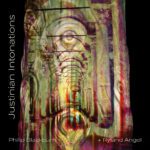JOHN LUTHER ADAMS – ARCTIC DREAMS 
The works of John Luther Adams are often closely connected to landscapes and the places he lives or has lived. Examples are The Become Trilogy (Become River, Become Ocean, Become Desert), and Lines Made By Walking. Arctic Dreams is no exception: Adams lived in Alaska for many years before he moved to rural New Mexico some six years ago.
Arctic Dreams is scored for four string players (violin, viola, cello, bass), four singers (Synergy Vocals: 2 sopranos, alto, bass) “enhanced with three layers of digital delay that create 32-part canonic textures – with delay times ranging from 1.125 to 32 seconds”.
The string sounds, Adams writes, “are all produced by natural harmonics, or open strings.” Only the C string of the cello is tuned at its usual pitch; all other strings are extensively retuned.
“The sung text is a series of ‘Arctic Litanies,’ composed of the names of Arctic places, plants, birds, weather, and seasons, in the languages of the Iñupiat and Gwich’in peoples of Alaska.”
This does not mean these texts are intelligible: the syllables are stretched into unrecognizable words.
The dreamlike effect of this is felt specifically in the earlier parts of the seven sections. But things do not remain as peaceful as they seem. Closer to the end, somewhat worrisome unrest, or even turmoil, is introduced, climaxing in One That Stays All Winter. Not everything in the Arctic is dreamlike, obviously.
Arctic Dreams is dedicated to Adam’s friend Barry Lopez, author of the award-winning book with the same title. In this book, he explores “the many-faceted wonders of the Far North.”
The book is described as “a timeless meditation on the ability of the landscape to shape our dreams and to haunt our imaginations”.
Which is also applicable to Adams’ musical interpretation.
PHILIP BLACKBURN – JUSTINIAN INTONATIONS 
The 50-minute title track on Justinian Intonations is preceded by a short 5-minute track called Out Beyond: A Call For Non-Judgment. It is an invocation to prepare the listener for what is coming later. Out Beyond is written for conch shell chorus and voice, an old Persian text written by Jalāl ad-Dīn Mohammad Rūmī (1207-1273), sung by Ryland Angel.
“Out beyond ideas of / right-doing and wrong-doing,/ there is a field. I’ll meet you there. […] People are going back and forth / across the doorsill / where the two worlds touch. The door is round and open. Don’t go back to sleep.”
Entering (almost literally) Justinian Intonations is almost like entering an entirely different world or dimension. And, in a way, it literally is: the origin of these recordings are found in the 5th and 6th century Theodosius and Basilica cisterns in Istanbul.
“Two enormous tanks made from marble and granite with giant columns supporting arched roofs. Built to filter and store water from nearby aqueducts, they even included subaquatic carvings and statues of Medusa arguably never meant for human eyes. Water, when you need it, is truly sacred.”
When Philip Blackburn recorded and analyzed acoustic test tones in the cistern and experienced the immersive reverb – “wave after wave; underground music suitable for any float tank experience” – it inspired him to create this electro-acoustic composition. For this work he stretches the existing reverb even further, mixing Ryland Angel‘s voice deep into the stretched layers of vocal chords and electronics.
The piece is named after the Byzantine emperor, Justinian I, who recovered from the first plague pandemic in 542 (which was then named after him), and who enlarged the (already existing) cisterns to make sure there would be enough supplies of healing water. This history directly links Justinian Intonations to the actuality of our own time. It’s the moment “the two worlds touch”.
“Don’t go back to sleep.”





